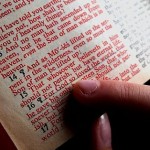One of the key tests of a false prophet is false prophecy, predictions that do not come true (Deuteronomy 18:21-22). But if a prophecy does not come true in the short term, does that mean that it is false? Not necessarily. What if the prophecy is about the distant future? Only where there is positive disproof (such as a time limit) can we say that a prediction was a false prophecy.
The issue is whether or not a prophecy truly comes from YHWH. The prophets of Baal in 1 Kings 18 spoke in the name of a false god, so even if they made any predictions that came true, they were to be rejected as false (Deuteronomy 13:1-3).
Moses gives the advance warning, but false prophecy does not become a hot-button issue until the time of Jeremiah and Ezekiel. The classic example is Jeremiah 28:1-17, where a prophet predicts in YHWH’s name that the Judeans who were first taken into exile will be coming home within two years. God says of such prophets in Jeremiah 29:9, “They are prophesying a lie to you in my name: I did not send them.” Likewise, God complains in Ezekiel 13:1-7 about prophets who prophesy out of their own imaginations, and have seen nothing.
The first reported case of false prophecy is the court prophets of Ahab, who prophesy in the name of YHWH that Ahab will win if he goes up to battle at Ramoth-Gilead (1 Kings 22:6). Micaiah declares that they are channeling a lying spirit sent to deceive Ahab into dying in battle (1 Kings 22:20-23). Micaiah lays down the acid test of his word: “If you (Ahab) truly return in peace, YHWH has not spoken by me.” (1 Kings 22:28) In the following battle, Micaiah is proved true, and Ahab’s court prophets are conclusively proved false.

Jeremiah’s prophecy that King Jehoiakim of Judah will be buried “with the burial of an ass” (Jeremiah 22:18-19) is an interesting case, because we have no confirmation of its fulfillment. The Bible records Jehoiakim’s death, but says nothing about how he was buried, unlike previous kings. One might ask, however, whether this prophecy was likely to have been preserved if it had proven false.
Sometimes, Biblical prophecies will be preserved even when they seem not to have come true, because the predictions are reinterpreted. That itself becomes part of the challenge in understanding prophecy. But a prophecy like Jeremiah 22:19 seems hard to misunderstand, and comes with a clear time limit. If we had outside evidence that Jehoiakim was dumped outside the city, critics would allege that the prophecy was written after the fact. Here, it is more likely that the prediction was kept because it proved true, even though we have only the Bible’s strong track record to go on.
Isaiah predicted that Babylon would become a wasteland that would never be rebuilt (Isaiah 13:19-22). It did not become a wasteland immediately, but the prophecy was gradually and eventually fulfilled beyond the time of Isaiah or whatever time to which one may assign this prophecy.
But how do we explain Ezekiel’s prophecy that Nebuchadnezzar would destroy Tyre (Ezekiel 26:1-14)? In Ezekiel 29:17-20, God himself declares that Nebuchadnezzar’s army got no plunder from Tyre, so God announces that he will give them the land of Egypt as payment for their labors. It would be easy to mistakenly conclude from Ezekiel’s first prophecy that Nebuchadnezzar would do the whole job of destruction. The second prophecy is included in the text to correct this misunderstanding.
Sometimes, Biblical prophets give prophecies that may not have appeared to be true at first. In Haggai 2:21-23, God says to Zerubbabel , governor of post-exilic Judah, that he will “shake heaven and earth” and “overthrow the throne of kingdoms.” On that day, God says to Zerubbabel, “I will make you like a signet ring, for I have chosen you.” When did this happen? Haggai’s audience may have heard these words to mean that Zerubbabel would soon become the world-ruling Messiah. Only when this meaning did not pan out did Judah figure out that this prophecy must have been for a day of the Lord at the end of time.
What about prophets and prophecy today? Prophecy is one of the New Testament gifts of the Spirit in 1 Corinthians 12:10, but Paul recommends that believers weigh what they say (1 Corinthians 14:29), and John urges his audience to “Test the spirits, whether they are from God.” (1 John 4:1) Much of today’s prophecy is not prediction but exhortation, and can be judged according to what God has already spoken in our canonical Bible. As for predictions, one must be careful to name God as the one who has spoken them, lest one be proved false.
Our friends the Latter Day Saints require us to think hard about the role of prophets today. They ask us, “If you claim to be part of the true Church, where are your apostles and prophets? We have a living Prophet and Apostles to guide us in these latter days.” They quote Amos 3:8: “Surely the Lord God does nothing without revealing his secret/inside scoop (sōd) to his servants the prophets.”
Such claims deserve a reasoned response. Jesus says about prophets, “You will know them by their fruits.” (Matthew 7:15-20) The issue is not the followers, but the leaders, particularly the founders of a movement. Such an investigation is beyond the self-imposed scope of this blog, but readers may research the lives of early LDS leaders and draw their own conclusions. The same is true for reported predictions by these leaders, whether or not they proved to be true, and whether the predictions themselves were reliably reported; if no such prediction was made, the issue becomes moot. I will grant to cases of potentially false predictions the same benefit of the doubt that I give to the Biblical prophets.
However, to me, the time when the LDS Church most desperately needed a prophet was when Mormon document forger Mark Hofmann was selling the church fake documents claiming to be from Joseph Smith (see https://www.fairmormon.org/answers/Forgeries_related_to_Mormonism/Mark_Hofmann), and committed two murders in an attempt to cover up the crime. To be sure, major Christian institutions have likewise been stung by deceivers (see https://en.wikipedia.org/wiki/Foundation_for_New_Era_Philanthropy), but none of those institutions claimed to be guided by a modern-day prophet.
But even if a leader’s predictions all come true, there remains the issue of which God is being proclaimed. For Joseph Smith’s doctrine of God, read pages three and four of his funeral sermon for elder King Follett at https://en.wikisource.org/wiki/Journal_of_Discourses/Volume_6/Character_and_Being_of_God,_etc., a sermon preached just four months before Smith’s death. A limitless number of gods who started out as human beings, does not in my opinion fit the Biblical requirements for the teaching of a true prophet.
It is always a sober and serious matter to speak for God. We do well to rigorously test the spirits who claim to do so, while being cautious about predictions where we don’t know the whole story.












